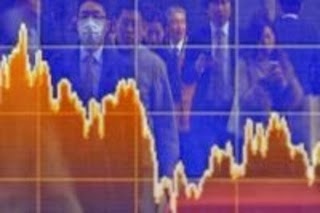image: VOR
“Japan’s economic policy is not as effective as expected.”
Money created by Bank of Japan (BOJ) won’t bring about economic recovery unless it is distributed in real economy.
Even if carrying out Abenomics, only bubble business sectors make profits and created money ends up being used for investment. I doubt if most money is being used to help prolong the life of the U.S. government.
It is fine for BOJ to print money. However, distribution of money to bubble
business sectors will not bring about economic recovery because it is used for
economic casino. To my surprise, the
worst Abe administration is going to use the money to construct the casino,
which is a place for social intercourse of people who are making profits.
The only word for the administration is an “ultimate
fool.” Money created by BOJ won’t bring
about economic recovery unless distributed in real economy. Incomprehensibly enough, I have never heard
any economists speak about something obvious.
Economic recovery is quite simple. As done in Iceland, exemption from housing
loan or distribution of millions of yen to each household is enough for the recovery. This measure is far more effective than
Abenomics because personal consumption is sure to rise.
I think how absurd this world is.
Masatoshi
Takeshita
December
10, 2013
English translation of the Japanese version
of Radio Iran – December 9, 2013 –
“Japan’s
economic policy has not produced as great an effect as expected.”
Mr. Lai told at an interview with Press TV
about a decline in Japan’s economic growth: “Many economists think that the
Japanese government will review its economic growth rate and finally revise it
downward.”
Furthermore, “It should be noted that the third quarter of this year has dropped significantly
compared with the second quarter.
Usually, it is quite difficult for such economy to achieve positive
economic growth for two consecutive quarters.
There is concern that economic policy by the Abe administration has not been
carried out smoothly as expected,” he said.
He also thinks that the government’s
short-term measure to stimulate the economy such as fund injection to the
market cannot have a long-term influence on the economy and that it is unlikely that the current economic policy by the
government will resolve the Japan’s economic problems in the long run.
----------
English translation of a Japanese article: Nevada blog – December 10, 2013 –
Japan Slides down to Triplet Deficit
Japan is about to face the world’s worst economic
and financial situation and has got into the red, though Japan used to attack
against the U.S. deficit.
Japan had asked the U.S.
to stop the weak dollar policy and strongly urged it to eliminate the twin
deficit. However, the shoe is on the
other foot now.
Current-account deficit - The first deficit in nine months in
October.
Trade deficit - 191.9 billion yen of deficit in October, too (an increase of 640 billion yen compared to one year ago)
Budget deficit
Trade deficit - 191.9 billion yen of deficit in October, too (an increase of 640 billion yen compared to one year ago)
Budget deficit
Japan has been in the triplet deficit. From the view point of economics, it will
cause competitive deliberation and increase the interest rate, which will
result in weakening the economy.
Now Japan is in the world’s worst situation
and the yen gradually keeps weakening.
Procurement of 70 percent of national debt by the BOJ makes it barely
maintain the value. However, nobody
knows when national debt will take a nosedive by selling in the market. Most Japanese don’t know about it.
Government bond market is propped up by BOJ
and banks. However, once the market goes
into selling mode, BOJ will be the only buyer and it cannot prop up the market.
With current-account deficit following
trade-deficit, Japan does not have that much time left.
